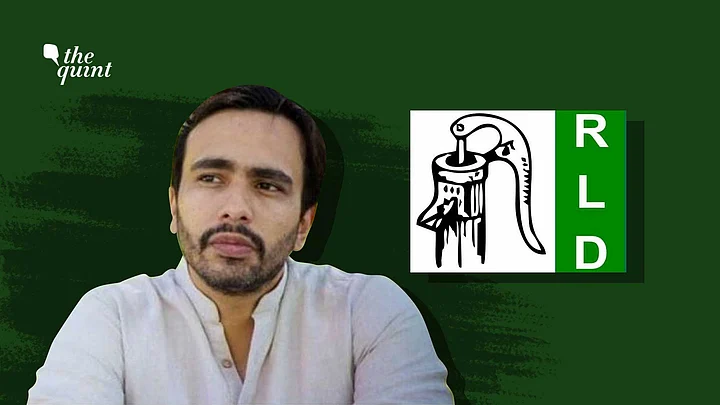Rashtriya Lok Dal chief Chaudhary Jayant Singh formally announced on Monday 12 February that his party will be joining the BJP-led National Democratic Alliance (NDA). He said that this decision was taken in a short period of time and "wasn't a move that had been planned long ago".
The RLD chief also removed "#INDIA" from his Twitter bio, marking a formal exit from the Opposition INDIA bloc.
Now, it would be tempting to reduce the impact of the RLD's shift to a few seats in its main area of influence - Western Uttar Pradesh.
This article will argue that this is actually part of a much bigger plan.
Jayant is No Nitish Kumar
Jayant is not like Nitish Kumar. The RLD hasn't been a BJP ally since over a decade. The last time RLD was a BJP ally was in the 2009 Lok Sabha elections, 15 years ago. Then in 2012, they joined the Congress-led UPA. In the 2019 Lok Sabha elections and 2022 Assembly elections, the RLD was part of the Samajwadi Party-led alliance.
The RLD has been in the anti-BJP camp for well over a decade. Jayant also isn't like the parties whose leaders were facing cases by Enforcement Directorate or Income Tax department.
Even after the 2013 Muzaffarnagar riots, when there was a strong polarisation among Jats, the RLD remained in the secular camp. It lost a sizable chunk of its Jat base to the BJP in the aftermath of the riots and for several years it failed to recover that base.
It managed a partial recovery in the 2022 Assembly elections. It won nine seats in alliance with the SP. Eight out of nine seats were from the Hastinapur belt where sugarcane farmers are present in sizable numbers. The farmers protest against the Union government's farm laws got good traction among the sugarcane farmers and that contributed to the RLD's revival in this belt.
However, it failed to revive in other Jat pockets like Mathura and Bulandshahr.
Jayant was one of the few leaders who mounted an ideological challenge to the BJP. During rallies, he would tell the audience, "Please tell me beforehand if you plan to vote on the basis of Hindu-Muslim. I will not waste my time asking for your support then".
Like his grandfather Chaudhary Charan Singh, father Chaudhary Ajit Singh and legendary farmer leader Chaudhary Mahendra Singh Tikait and the BKU, Jayant stood first and foremost for agrarian politics even though his primary base lay with the Jat community.
In the face of rising communal polarisation, Jayant continued to push for agriarian politics as the antidote. The 2020-21 farmers' protest and the central role of Rakesh Tikait, gave the RLD a chance to revive this strand of politics.
However, with Jayant now choosing to join the NDA. It represents an admission of defeat at pushing this strand of politics in opposition to the BJP.
2. BJP's Hegemonic Nature
The BJP's Mission 370 for itself and Mission 400 for the NDA isn't just about numbers, it is about domination. The BJP is trying to establish itself as an hegemonic force in Indian politics. It wants to control every strand of political negotiation (provided it doesn't conflict with Hindutva). For instance, the NDA includes a party with Ambedkarite roots - RPI (Athawale), parties with socialist roots like JD-U, JD-S and JJP, two strands of Marathi regionalism - Shiv Sena and NCP, Assamese Nationalism - AGP etc.
Now it is trying to subsume the RLD's brand of agrarian politics as well.
The BJP's message is that - 'if you are a pressure group and want to get work done for your community or interest group, you have no choice but to join us because we will be in power for a long time to come. In return, we will give you some space and honour your icons'.
So long as any of these strands of politics aren't incompatible with Hindutva, the BJP is willing to give space to all of them. However, it makes it clear that all these parties and their strands of politics have to remain subservient to BJP and Hindutva.
For instance, Athawale has been given a Rajya Sabha seat and the RPI (Athawale) wasn't given seats to contest in Maharashtra. Similarly, the AGP has been reduced to a minor player in Assam's politics and the BJP has emerged as the main champion of nationalist sentiment in the state. Hardik Patel, who like Jayant tried to take his community towards agrarian politics and against Hindutva, has been accommodated as an MLA.
It is quite likely that the RLD will be given only a handful of seats to contest by the BJP and could go in the same direction.
It remains to be seen how the BJP accommodates a party like the Shiromani Akali Dal or AIADMK whose core bases are not comfortable with the BJP's Hindutva ideology.
3. Future Place of RLD
Parties like the RLD, JD-U and NCP (Ajit Pawar) are also part of the BJP's plans for the future. These parties are meant to have an semi-independent identity so that they are in a position to bring on board people and sections who may not be comfortable with joining the BJP directly but want to be on the right side of those in power. It may also be for those who the BJP doesn't want in its ranks for fear of diluting its own Hindutva credentials.
The main, though not only target section for this plan, would be minorities especially Muslims. The BJP doesn't want to dilute Hindutva but it wants to deprive the Opposition of this support base.
It is no coincidence that the RLD continues to have in its ranks a few Muslims who are prominent in the media and social media.
The BJP's plan for domination is clear. And Jayant Singh, like many others before him, seems to have accepted defeat and become part of this plan.
